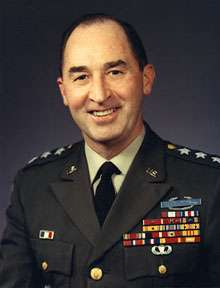Arthur S. Collins Jr.
Arthur S. Collins Jr. (August 6, 1915 – January 7, 1984) was a United States Army Lieutenant General, who served as commander of I Field Force, Vietnam during the Vietnam War.
Arthur Sylvester Collins Jr. | |
|---|---|
 | |
| Born | August 6, 1915 Boston, Massachusetts |
| Died | January 7, 1984 (aged 68) Washington D.C. |
| Buried | |
| Allegiance | United States of America |
| Service/ | |
| Years of service | 1938–1974 |
| Rank | |
| Commands held | I Field Force, Vietnam 4th Infantry Division 130th Infantry Regiment |
| Battles/wars | World War II Vietnam War |
| Awards | Distinguished Service Medal (4) Silver Star |
Early life and education
Collins was born on 6 August 1915 in Boston, Massachusetts.
Military service
He graduated from the United States Military Academy, West Point, New York, with a Bachelor of Science degree in 1938 and was commissioned as a second lieutenant in the infantry.
WWII
In May 1942 he was appointed as battalion commander of the 1st Battalion, 130th Infantry Regiment. In May 1944 the 130th Infantry deployed to Finschhafen in New Guinea. In August 1944 Collins assumed command of the 130th Infantry, commanding the regiment during the Battle of Morotai and Battle of Luzon, where the 130th Infantry participated in the capture of Baguio. The 130th Infantry then participated in the Occupation of Japan, landing there in September 1945.
Vietnam War
In June 1965 he was appointed as commander of the 4th Infantry Division and led it during its deployment to South Vietnam in August 1966 and remained in command until January 1967.[1]
In January 1970 LTG Collins was appointed to command I Field Force, Vietnam, which he commanded from February 1970 to January 1971. Upon reviewing some of the more optimistic portions of his predecessor General William R. Peers' debriefing report, he questioned the existence of any discernible progress during the past two years. "Frankly," Collins observed, "I do not know what happened between 1968- 1970," believing that "if the ARVN combat units had improved as much as indicated by General Peers, somewhere along the line they had again slipped back a long way." Upon his arrival in February 1970, Collins judged that the local Vietnamese forces were "woefully weak because of lack of leadership at the regimental and battalion level," and he exhibited little of Peers' optimism.[2]:401–2
Post Vietnam
He served as acting Commanding General, United States Army Europe from 20 March to 26 May 1971.
He retired from the Army in July 1974.
He died on 7 January 1984 in Washington D.C. and was buried at West Point Cemetery.
References
![]()
- MacGarrigle, George (1998). Combat Operations: Taking the Offensive, October 1966 to October 1967. Government Printing Office. p. 64. ISBN 9780160495403.
- Clarke, Jeffrey (1998). The U.S. Army in Vietnam Advice and Support: The Final Years, 1965-1973 (PDF). U.S. Army Center of Military History. ISBN 978-1518612619.
